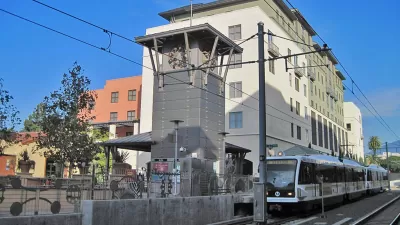After a state decision to abolish California's redevelopment agencies seven years ago, Los Angeles still received some of that money, directing it to city services instead of affordable housing.

Around seven years ago, conflict engulfed California's redevelopment agencies. Critics charged them with cronyism and the state eventually decided to shut them down, ending what was originally intended as a source of funds to address blight with new affordable homes.
But while the agencies are gone, some of the funding is still there. Dakota Smith and Emily Alpert Reyes write, "Some of the funds that used to go to agencies now flow to cities, counties, special districts and schools. Los Angeles has received more than $394 million in former redevelopment dollars — also known as 'boomerang funds' — since redevelopment ended."
Under Mayor Eric Garcetti, those funds have been directed to the "day-to-day budget to help cover spending on police, firefighters and other city services, along with growing costs for retired employees." But given the continuing escalation of L.A.'s housing crisis, some are asking whether that was the right call.
Meanwhile, L.A. is taking other steps to address the shortage. "Garcetti has helped secure new sources of funding to house the poor in the last year and a half: A bond for homeless housing is bringing in more than $75 million this budget year, according to city officials. A new 'linkage fee,' which charges developers for new construction, could yield as much as $100 million annually for affordable housing after it goes into full effect next year."
FULL STORY: When L.A. opted to fund city services over housing, did it help fuel a crisis?

Planetizen Federal Action Tracker
A weekly monitor of how Trump’s orders and actions are impacting planners and planning in America.

Chicago’s Ghost Rails
Just beneath the surface of the modern city lie the remnants of its expansive early 20th-century streetcar system.

San Antonio and Austin are Fusing Into one Massive Megaregion
The region spanning the two central Texas cities is growing fast, posing challenges for local infrastructure and water supplies.

Since Zion's Shuttles Went Electric “The Smog is Gone”
Visitors to Zion National Park can enjoy the canyon via the nation’s first fully electric park shuttle system.

Trump Distributing DOT Safety Funds at 1/10 Rate of Biden
Funds for Safe Streets and other transportation safety and equity programs are being held up by administrative reviews and conflicts with the Trump administration’s priorities.

German Cities Subsidize Taxis for Women Amid Wave of Violence
Free or low-cost taxi rides can help women navigate cities more safely, but critics say the programs don't address the root causes of violence against women.
Urban Design for Planners 1: Software Tools
This six-course series explores essential urban design concepts using open source software and equips planners with the tools they need to participate fully in the urban design process.
Planning for Universal Design
Learn the tools for implementing Universal Design in planning regulations.
planning NEXT
Appalachian Highlands Housing Partners
Mpact (founded as Rail~Volution)
City of Camden Redevelopment Agency
City of Astoria
City of Portland
City of Laramie





























